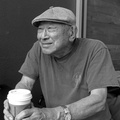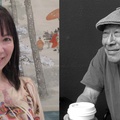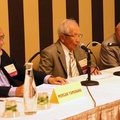When we arrived at Tule Lake in the morning, we were greeted by a man who claimed to be our Block Manager. It was nice to have someone welcome us on our arrival at this desolate place near the northern border of California. “If you need anything just ask me,” he said. He provided us with mattresses and Army blankets; we unpacked and settled in.
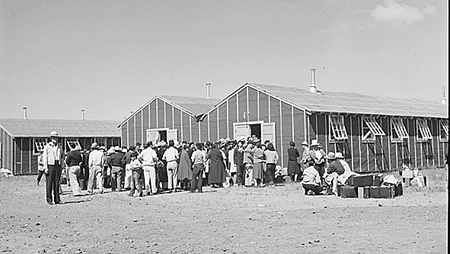
Group of new arrivals at Tule Lake. (Source: Central Photographic File of the War Relocation Authority U.S. National Archives, Record group 210)
After the miserable experience in Arboga, we were excited about the flush toilets in the latrines. In fact, we made a special trip to the latrine to check them out—two rows of porcelain toilets that actually flushed. We tried it several times to see if they really worked; they did. However, the lack of partitions between the toilets and the trough urinals for the men were a bit disconcerting.
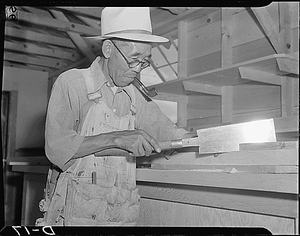
A cabinet worker at Tule Lake. (Source: Central Photographic File of the War Relocation Authority U.S. National Archives, Record group 210)
One of the first things I did was to look for work. I took the first available job as a carpenter’s helper putting up sheet rock in the apartments. I joined a motley crew of five or six men of disparate ages. I believe I was the youngest among them. Except for the crew chief, none of us had had much experience as carpenters. Some were barely able to hit a nail straight, but we were welcomed everywhere as daiku-san (carpenter).
People moved out all their furniture (crude tables and chairs, hastily made from scrap lumber) and waited for us to finish the job. I remember we were served sodas and refreshments and treated rather royally, which to me was embarrassing. I thought we were just doing a job, making the quarters livable, finishing what the government had failed to do.
The searchlights at night were eerie. Many of the soldiers in the guard towers were recent transfers from the war in the South Pacific, young, nervous, and trigger-happy. We didn’t dare go near the fence for fear of being shot at; there were tragic instances of that. But aside from the physical confinement, there was the invisible fence enclosing our spirit. This imprisonment of the spirit, the psychological effect, even more than the actual fence, was to be the most ravaging part of the camp experience, leaving a scar that would remain with us for the rest of our lives.
I was determined to make the best of the situation. I attended classes in sociology and public speaking that were taught by recent students at UC Berkeley and other colleges. I went to the library and checked out books to read. I remember reading John Steinbeck’s The Grapes of Wrath, a novel I enjoyed and identified with; I had met some of the “Okies” that Steinbeck wrote about. And, of course, I was familiar with fruit picking and life in the labor camps.
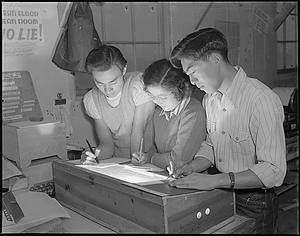
Working on the "Tulean Dispatch" (Source: Central Photographic File of the War Relocation Authority U.S. National Archives, Record group 210)
Then there was an item in the Tulean Dispatch, the camp newspaper, calling for people interested in acting to form a little theater and I found my home. I was to spend most of my non-working hours with the theater group. I learned acting by actually performing on stage in front of an audience. That was heady and soon I was playing lead parts.
We presented a program of three one-act plays that we performed every night for about two weeks. The plays were all American plays with Caucasian characters. We, inmates of a prison for Japanese, were ironically portraying Caucasian characters—and our audience loved it. I think we, the performers as well as the audience, were only interested in theater: the curtain, the lights, the actors, the make-believe. Actually, we had no choice, because there were no plays about Japanese Americans. No one was writing original plays; that was to come much later after the war.
I remember playing a righteous cleric with a turned-back collar in a comedy that was great fun. I also played a dream-maker in a fantasy about a romance between Pierrot and Pierrette, wearing a large, ungainly hat. My most notable role was as a condemned prisoner meeting his execution, spouting lines from Shakespeare about “cowards die many times before their death; the valiant but once.” The play was “The Valiant.” I had to smoke in the part so I rehearsed handling a cigarette. That probably started my smoking habit. I heard that some of my friends came just to watch me smoke on stage.
I also joined a writers club. I think we met weekly. Most of the members were college students, either from Cal or UCLA; to me, a mere high school graduate and a country kid at that, everyone seemed highly educated and sophisticated. I knew I didn’t belong with them, but my interest in writing drew me to the club.
Feeling small and inadequate, I sat quietly, watching and listening to the proceedings. Everyone was encouraged to write something and read it to the group for comments and criticisms. Not everyone wrote; many were observers. Those who wrote were writing about life before camp—city life, college life, both new to me. Some wrote fiction in the manner of the hard-boiled detective genre or in the Dos Passos or Hemingway style. It all sounded great and everyone was impressed. I was too. Thinking back, the writing wasn’t so hot. In fact, it was pretty bad—often sophomoric. No one in the group that I know was a writer or became one. I think a few became scholars.
I wrote a story that was based on something that happened just before evacuation. It was autobiographical, hand-written, about a country boy longing for a radio and finally one day taking the Greyhound bus to Sacramento and buying a small Zenith radio. What a thrill that was—a brand new radio, all his own, that played loudly and clearly, especially at night. But he didn’t get to enjoy it for long because of the war and evacuation. I don’t remember what happened after that….I’m sure he took the radio to camp…maybe it stopped playing. I remember the story was titled “The Zenith Radio.”
As I finished reading the story, I expected some reaction but there was none, just silence. Why didn’t they say something? Did they not like it? I have wondered why they didn’t say anything. Did they resent the fact that this young country hick had shown them up, had written a story that moved them or was the story too close to home? I decided it wasn’t much of a story. Later, the leader of the club wanted to publish the story and asked me for it but by then I had thrown it out. I realize now that I missed a rare opportunity as the Tulean Interlude, a magazine collection of writings done in Tule Lake camp, became a primary source for scholars. It is deposited in the Bancroft Library at UC Berkeley, along with other camp documents.
*This article was originally published in Swimming in the American, a Memoir and Selected Writings, San Mateo, CA, Asian American Curriculum Project, 2005.
© 2013 Hiroshi Kashiwagi



